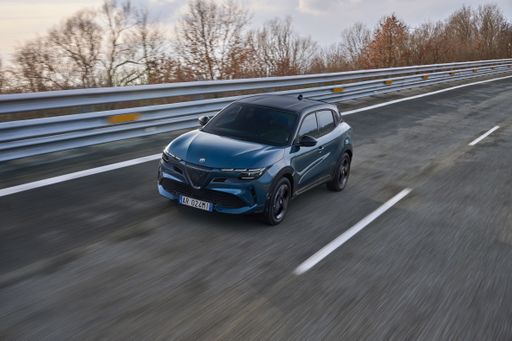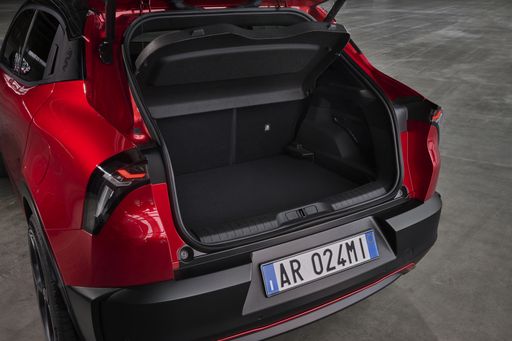Alfa Romeo Junior vs Toyota Proace City Compact Van – Differences & prices compared
Compare performance, boot capacity, efficiency and price at a glance.
Find out which car is the better choice for you – Alfa Romeo Junior or Toyota Proace City Compact Van?
Costs and Efficiency:
Price and efficiency are often the first things buyers look at. Here it becomes clear which model has the long-term edge – whether at the pump, the plug, or in purchase price.
Toyota Proace City Compact Van has a distinct advantage in terms of price – it starts at 21200 £, while the Alfa Romeo Junior costs 25700 £. That’s a price difference of around 4491 £.
Fuel consumption also shows a difference: Alfa Romeo Junior manages with 4.80 L and is therefore slightly more efficient than the Toyota Proace City Compact Van with 5.40 L. The difference is about 0.60 L per 100 km.
In terms of energy consumption, the advantage goes to the Alfa Romeo Junior: with 15.10 kWh per 100 km, it’s clearly perceptible more efficient than the Toyota Proace City Compact Van with 18.50 kWh. That’s a difference of about 3.40 kWh.
As for range, the Alfa Romeo Junior performs slightly better – achieving up to 410 km, about 73 km more than the Toyota Proace City Compact Van.
Engine and Performance:
Power, torque and acceleration say a lot about how a car feels on the road. This is where you see which model delivers more driving dynamics.
When it comes to engine power, the Alfa Romeo Junior has a decisively edge – offering 280 HP compared to 136 HP. That’s roughly 144 HP more horsepower.
In acceleration from 0 to 100 km/h, the Alfa Romeo Junior is significantly quicker – completing the sprint in 5.90 s, while the Toyota Proace City Compact Van takes 11.10 s. That’s about 5.20 s faster.
In terms of top speed, the Alfa Romeo Junior performs hardly perceptible better – reaching 206 km/h, while the Toyota Proace City Compact Van tops out at 186 km/h. The difference is around 20 km/h.
There’s also a difference in torque: Alfa Romeo Junior pulls a bit stronger with 345 Nm compared to 300 Nm. That’s about 45 Nm difference.
Space and Everyday Use:
Cabin size, boot volume and payload all play a role in everyday practicality. Here, comfort and flexibility make the difference.
Both vehicles offer seating for 5 people.
In curb weight, Toyota Proace City Compact Van is minimal lighter – 1358 kg compared to 1380 kg. The difference is around 22 kg.
In maximum load capacity, the Toyota Proace City Compact Van performs clearly better – up to 4300 L, which is about 3020 L more than the Alfa Romeo Junior.
When it comes to payload, Toyota Proace City Compact Van significantly takes the win – 921 kg compared to 420 kg. That’s a difference of about 501 kg.
Who comes out on top?
Overall, the Alfa Romeo Junior shows itself to be performs better in key areas and secures the title of DriveDuel Champion.
It convinces with the more balanced overall package and proves to be the more versatile choice for everyday use.
 @ Alfa Romeo / Stellantis Media
@ Alfa Romeo / Stellantis Media
Alfa Romeo Junior
Alfa Romeo Junior
The Alfa Romeo Junior captures the essence of Italian design with its sleek lines and compact dimensions, making it an icon of elegance and performance. With a spirited driving experience and a charming retro aesthetic, it appeals to enthusiasts and casual drivers alike. This delightful car embodies the brand's rich heritage while remaining a fun and engaging option for those seeking a unique automotive experience.
details @ Alfa Romeo / Stellantis Media
@ Alfa Romeo / Stellantis Media
 @ Alfa Romeo / Stellantis Media
@ Alfa Romeo / Stellantis Media
 @ Alfa Romeo / Stellantis Media
@ Alfa Romeo / Stellantis Media
Toyota Proace City Compact Van
The Toyota Proace City is a versatile compact van designed to cater to the needs of businesses and families alike. With its spacious interior and efficient engine options, it ensures a comfortable and agile driving experience, making it ideal for urban and suburban environments. The Proace City also offers a range of advanced safety features and connectivity options, ensuring both security and convenience on the road.
details
 @ Alfa Romeo / Stellantis Media
@ Alfa Romeo / Stellantis Media
|
|
|
|
|
Costs and Consumption |
|
|---|---|
|
Price
25700 - 41600 £
|
Price
21200 - 37700 £
|
|
Consumption L/100km
4.8 - 5.4 L
|
Consumption L/100km
5.4 - 6.6 L
|
|
Consumption kWh/100km
15.1 - 17.5 kWh
|
Consumption kWh/100km
18.50 kWh
|
|
Electric Range
344 - 410 km
|
Electric Range
337 km
|
|
Battery Capacity
0.4 - 51 kWh
|
Battery Capacity
-
|
|
co2
0 - 119 g/km
|
co2
0 - 150 g/km
|
|
Fuel tank capacity
44 - 45 L
|
Fuel tank capacity
50 - 61 L
|
Dimensions and Body |
|
|---|---|
|
Body Type
SUV
|
Body Type
Cargo Van
|
|
Seats
5
|
Seats
2 - 5
|
|
Doors
5
|
Doors
4 - 5
|
|
Curb weight
1380 - 1689 kg
|
Curb weight
1358 - 1837 kg
|
|
Trunk capacity
340 - 415 L
|
Trunk capacity
-
|
|
Length
4173 mm
|
Length
4401 - 4751 mm
|
|
Width
1781 mm
|
Width
1848 mm
|
|
Height
1505 - 1538 mm
|
Height
1860 mm
|
|
Max trunk capacity
1205 - 1280 L
|
Max trunk capacity
3300 - 4300 L
|
|
Payload
390 - 420 kg
|
Payload
560 - 921 kg
|
Engine and Performance |
|
|---|---|
|
Engine Type
Electric, Petrol MHEV
|
Engine Type
Electric, Diesel, Petrol
|
|
Transmission
Automatic
|
Transmission
Automatic, Manuel
|
|
Transmission Detail
Dual-Clutch Automatic, Reduction Gearbox
|
Transmission Detail
Reduction Gearbox, Manual Gearbox, Automatic Gearbox
|
|
Drive Type
Front-Wheel Drive, All-Wheel Drive
|
Drive Type
Front-Wheel Drive
|
|
Power HP
136 - 280 HP
|
Power HP
102 - 136 HP
|
|
Acceleration 0-100km/h
5.9 - 9.1 s
|
Acceleration 0-100km/h
11.1 - 13.2 s
|
|
Max Speed
150 - 206 km/h
|
Max Speed
135 - 186 km/h
|
|
Torque
230 - 345 Nm
|
Torque
205 - 300 Nm
|
|
Number of Cylinders
3
|
Number of Cylinders
3 - 4
|
|
Power kW
100 - 207 kW
|
Power kW
75 - 100 kW
|
|
Engine capacity
1199 cm3
|
Engine capacity
1199 - 1499 cm3
|
General |
|
|---|---|
|
Model Year
2024 - 2025
|
Model Year
2024
|
|
CO2 Efficiency Class
A, C, D
|
CO2 Efficiency Class
A, E
|
|
Brand
Alfa Romeo
|
Brand
Toyota
|
What drive types are available for the Alfa Romeo Junior?
Available configurations include Front-Wheel Drive or All-Wheel Drive.
The prices and data displayed are estimates based on German list prices and may vary by country. This information is not legally binding.
